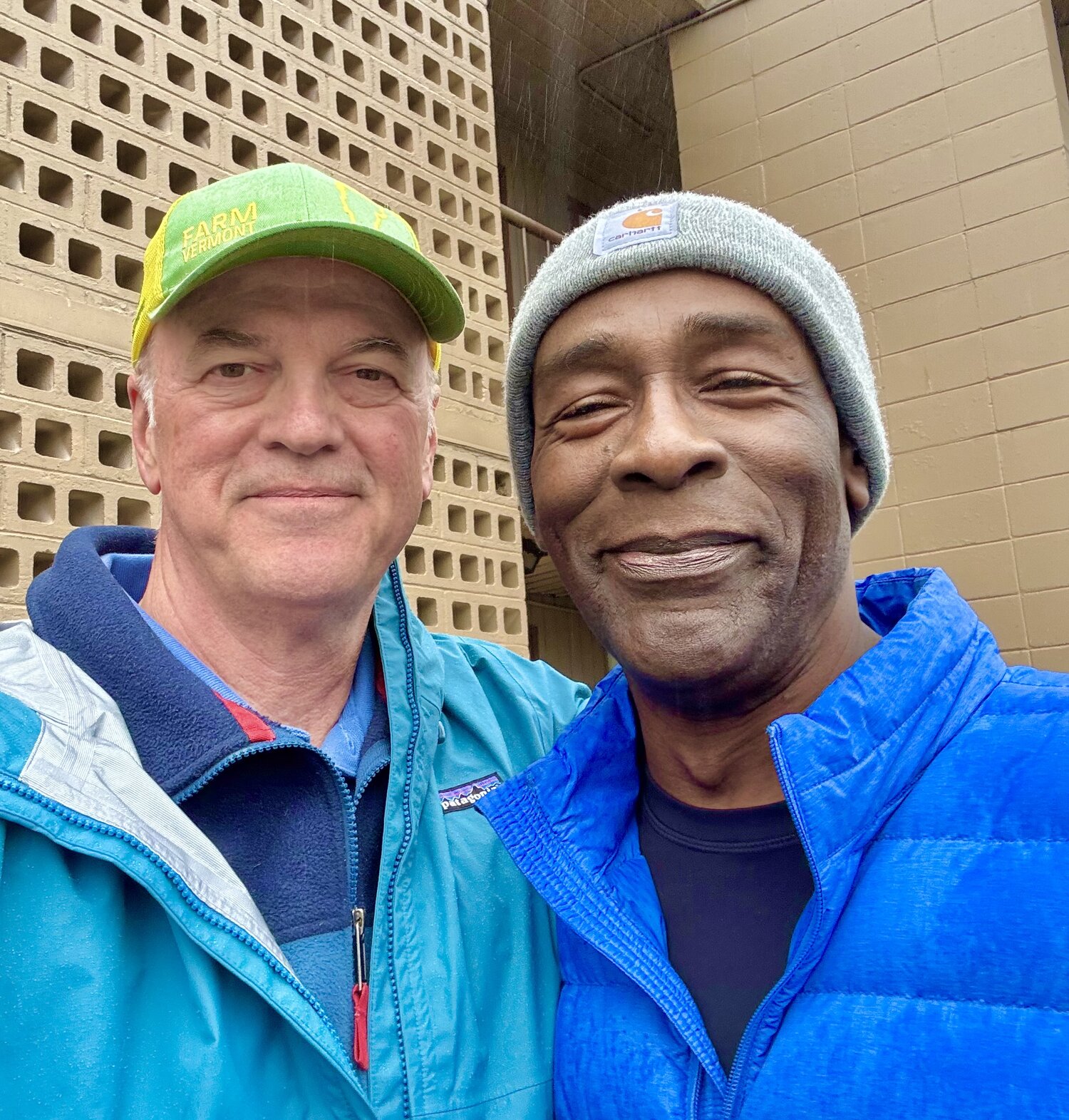Freedom & Unity: Peace & Happiness, For Everyone

Addison Independent May 15, 2025
By Jerome Hazelwood & Tom Morgan
This week Jerome Hazelwood is in conversation with Tom Morgan.
Fourth in a series.
Like too many disenfranchised Americans, Jerome Hazelwood is an unhoused neighbor of our community. BIPOC neighbors are five times more likely to experience homelessness in Vermont than their white neighbors. Since this interview, he was “exited” from Vermont’s Emergency Housing Program motel shelter. Through collaboration with local partners, he is now safely sheltered again.
Tom: How are you doing, Jerome?
Jerome: I’m doing fine today. On the whole, a lot’s going on. With the end of Vermont’s seasonal motel shelter program, I might lose my room. I am trying to get all the forms and records the state needs, and that’s not easy. People think everyone has a car and a computer and a cell phone. I have a cell phone and people that help. But it is challenging.
I’m not complaining. I have a roof over my head and a bed to sleep in. So, for now, I get to sleep and eat inside. Keeping food and cooking are interesting in the room, with just a microwave and a minifridge. Doing laundry is getting a little hard because I have to carry my laundry down the street to the laundry mat. When I’m having a bad health day, sometimes I just can’t do that, so I wash my clothes in the tub. My main problem right now is that the room door is easy to open, even when it’s locked. So I get a little anxious at night, and when I’m out during the day, I worry someone’s going to steal my things. But most of the things around me are stuff people gave to me, so I’m not complaining. I’m luckier than others.
Tom: You mentioned that people are helping you; do you feel you’re getting the help you need?
Jerome: Well, you know, I had to leave Addison County and come to Barre because there were no open [General Assistance Emergency Housing Program] motel rooms available there. So I was not familiar with people here like I was there. But the service providers here are helpful, and I have a few other friends that help. I have some health challenges, and getting medical care isn’t easy. Most people don’t think twice about calling to fix problems with their benefits. But I had suddenly lost my Social Security disability before just because I called to make a change to my Medicare, and the representative put something in the computer wrong that set off alarms that I was somehow doing something wrong. For most people, losing a benefit can be inconvenient; for me, it can be catastrophic.
I need some surgeries, but the system is so complicated, and I can’t afford to lose any benefits. But hey, I’m just biting the bullet. So I am probably saving the government some money, right?
Tom: We’ve known each other for a couple years now. What have the last two years been like for you?
Jerome: Well, you helped me when I was sleeping outside in Middlebury. You and Charter House helped me connect with veterans services in Rutland, and they eventually helped me get an apartment. I probably shouldn’t have taken that apartment. I know that sounds crazy to other people, a homeless guy refusing to take a place to live. But they probably don’t know what it’s like to be an African American man trying to live in an apartment in a drug-infested neighborhood in Vermont. Just walking back and forth to the store, people would look at me like I was a threat. At night, I’d go outside for a smoke and people would stare out their windows at me. I think some people just don’t or won’t understand. We live in different worlds.
Veteran services can be great. But here’s how it can be different for Black people: A guy is trying to convince me to go back and live in a veterans homeless shelter. Now I’ve stayed in a veterans shelter before. Most of the people who live there are very right-wing. Not everyone, just the loudest ones. In the time I’ve lived in Barre, I’ve experienced more racism. There is real hostility out there. Do you think I, as an African American, am going to go live in a place full of residents bashing Diversity, Equity and Inclusion all the time? Shelters are a weird place to live as it is. I’m not going to subject myself to the torment of racism in the place I live. I’ll sleep outside first — especially these days. Things are getting worse.
Tom: So when you hear the word “community,” do you think of safe spaces and kind people?
Jerome: I mean I have a solid network of friends, especially outside Washington County, who I know are there for me. But the hostility toward people like me is real here. Maybe people just don’t see me, an African American, as typical when I’m outside. I walk funny because I’ve had spinal surgery and I have cataracts and can’t see very well. When I walk down the street, white people just glare at me here. Doesn’t help me feel better about myself or my situation.
Tom: Jerome, what do you wish people knew about you?
Jerome: When a person meets me or walks by me, I want them to know that whatever I’m going through at that moment does not define me as a person. I am kind and a bit of a nerd. I’m just trying to deal with a lot.
Tom: What do you wish for?
Jerome: I’m in my 60s, and I am looking for some comfort and stability in my own life. But I really want to do things that help other people — practically speaking. I look in the mirror and I really don’t want to live in just a self-serving way. I want to help people living in situations like myself. It makes me feel I am accomplishing something.
Tom: Like the advocacy you’ve been doing in Montpelier and this interview for the Addison Independent?
Jerome: Right. I want to speak up. I’m around people suffering homelessness all the time. I’m next to that all the time. Most people will see us as addicts or poor, and they’ll say, “Why don’t they get themselves together.” Those people don’t understand that person’s life. The abuse people may have survived. Where were you people who judged us then? Nobody stepped in to help. No social service, no church, no neighbor. There’s so much that people don’t think about. People think, “I had problems and I pulled myself up.” Those people who say that they live in a different world.
So what do I wish for? Right now, peace and happiness. For everybody.
—————
Tom Morgan is the founder of Green Mountain Justice; find out more at greenmountainjustice.org.
